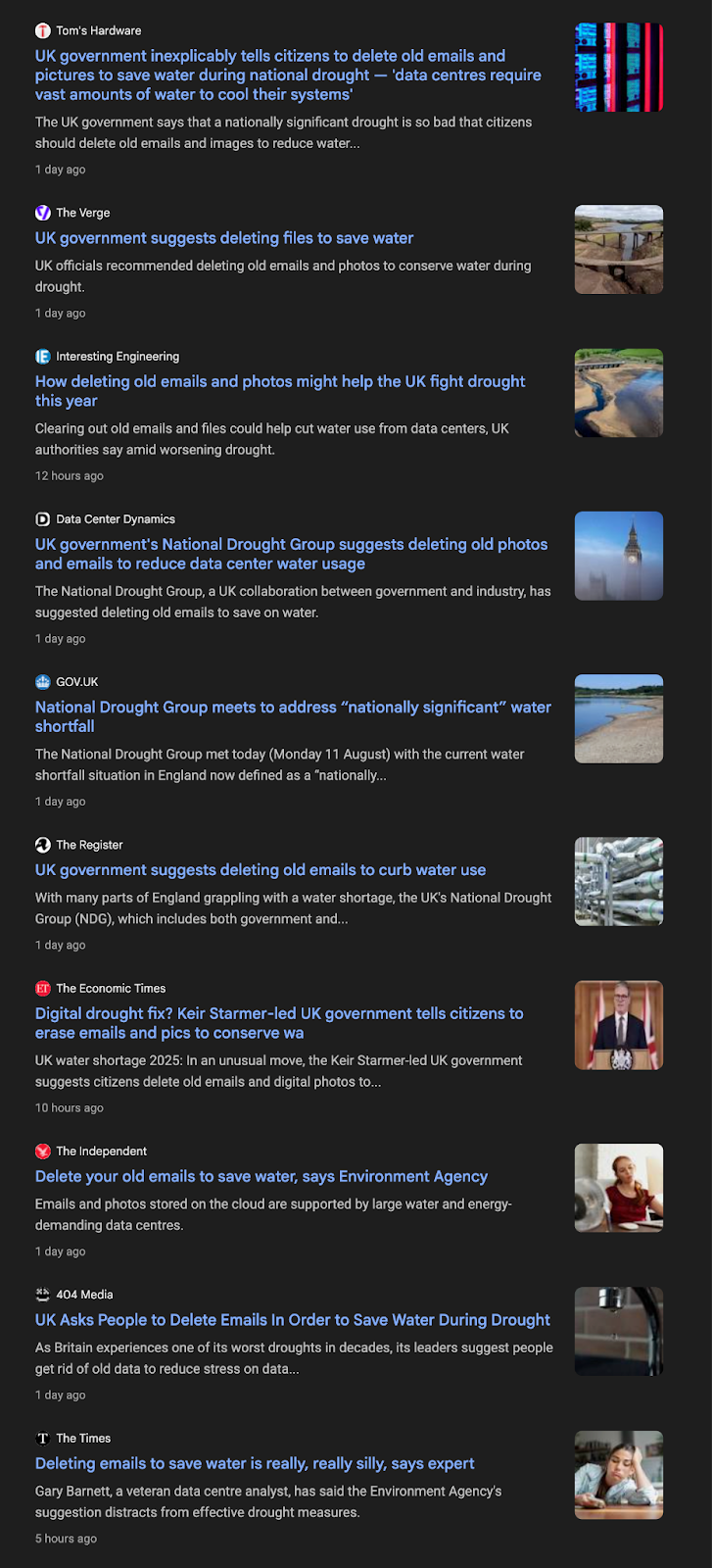Deleting Emails Won’t Save the Planet
But the claim does generate headlines
When I first saw the UK government’s suggestion to delete old emails to help conserve water, I fell for the click-bait. Surely this wasn’t serious climate advice, was it?

As someone who’s worked in tech for years, I have a pretty good sense about data centers. They do use water for cooling, and water is used in energy production. But the idea that deleting a few emails from your GMail inbox would meaningfully reduce water usage? That’s farfetched, at best.
Behind the headlines
The good news is that most of the reporting on this subject set the record straight about email storage in three dimensions:
Storage itself is a small part of the problem. Most of the data center cooling and energy requirements come from CPU and GPU computation, not high-capacity storage. Once data is stored, storage devices often generate very little heat and are often “spun down” (placed into low or no-power states), being called upon only when needed.
Let sleeping dogs lie. Going back in to retrieve archived or less frequently accessed emails and then marking them for deletion may actually use more energy and water in the short term than just letting them lie dormant. Application developers know that one-time retrieval costs in cloud storage can rival (or even exceed) monthly storage costs in lower storage tiers. For example, with Google Coldline Storage, the cost to retrieve data once is 0.02 cents per GB, an order of magnitude more than the monthly cost to store it at 0.004 cents per GB per month. In other words, taking action during a crisis could make things worse.
Any potential long-term water or energy savings might not even be local. Services like GMail utilize global data centers. Even if there were long-term savings from reducing storage requirements and data center footprints, a UK user deleting email might not actually save energy and water in the UK.
As such, anyone diving into the reported journalism covering this advice would likely be set straight.
So Why Say It?
Because it makes headlines.

In today’s media environment, boring and factual don’t cut it anymore. Telling people to take shorter showers or fix leaky faucets makes for sound advice, but that kind of advice isn’t going to make the news. Telling them to delete emails? That’s weird enough to get clicks.
And it worked. The email deletion plea got picked up by major outlets across the globe. It sparked debate, confusion, and curiosity. The PR folks behind the announcement clearly chalked this up as a win.
My frustration
We’ve reached a point where novelty beats substance. As a techie, I find it frustrating that we have to dress up climate advice with nonsense just to get people to care.
It’s not that I’m against awareness campaigns. Quite the opposite. But when the message is just misleading, I feel it risks undermining trust in the whole effort.
Unfortunately, this whole situation is just a case study in modern cause-based communication:
Novelty beats substance
Digital habits make for click-bait
Media strategy is often more prevalent than technical accuracy
If the goal was to generate headlines, mission accomplished. But if the goal was to drive meaningful change, we might need to rethink our tactics. What do you think?



A couple of thoughts:
- Many of these outlets are auto-generating these items from other feeds
- Amusingly, old/new e-mail is now causing a much bigger/different problem than storage, i.e. power and water. AI tools like SuperHuman and Cora use agents to read new/old e-mail to analyze and be able to answer questions, prioritize important messages, and generate intelligent responses. SH pre-answers EVERY e-mail so that users can see them instantly. So this activity will result in thousands of times the cost of storage.